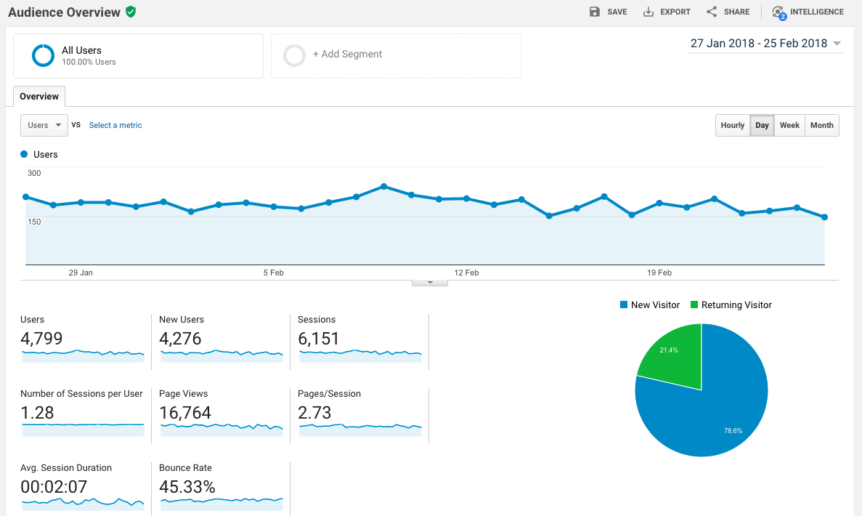Want to know whether you should use Google Analytics? Whether your initial intention was to simply have an attractive website that prospects could use to research your business, or whether you intend to use your website as a full-on lead generation / selling tool for your business, you need to ensure that your website is capable of tracking and measuring how visitors arrive at your website and how they behave when they get there. Without this insight you will struggle to plan content that will be of value to your visitors and will find it difficult to track, engage with and ultimately convert prospective clients.
Enter Google Analytics! Google Analytics is a free tool that you can use to track information about the way visitors to your site interact with it. It’s a powerful and often under-utilised tool and there are many benefits in using it.
Analyse sources of traffic
Google Analytics can show you how visitors find your website, eg if the traffic source is through a referral link from some other website, via organic searches, from paid advertisements, from search engines or from social media. Understanding the sources of traffic will enable you to assess what marketing activities are working, or not! And to help give you insight to activities that could drive more traffic to your website.
Information about visitors :-
Google Analytics provides detailed information about visitors to your website. Including detailed demographics about your visitors, what their interests are, where they are geographically located, how they behave when they are browsing your website and the device they used to access your site. They can tell you how the visitor found you, eg as a referral from another website, from social media or through organic or paid search. And they can also tell you what keywords or campaign they used to find you and the specific page they entered your website (it’s not always your home page) and the actual journey (page visits, forms completed, links clicked) they take as they navigate through your website; including the page they exited your site from. Understanding these behaviours helps you plan the content and more importantly the tools / interruptions you can add to your website to maximise engagement and conversions.
Real Time
Google Analytics is useful is that the data it collects is ongoing and in real time. This means that you can create reports, compare metrics, and check performance on whatever basis you want—hourly, daily, monthly, yearly, year over year, quarter over quarter. You can associate traffic changes with specific campaigns, take note of trends across certain time frames, and cater reports to your company’s reporting periods. You can also take note of peak times for your target audience, such as whether certain pages, SEM campaigns, or blog posts gather more interest at certain points of the week, month, or year.
Track Website Conversions
A conversion is the completion of any desired action to your website and with Google Analytics (such as a form completion, purchase, ebook download etc) you can not only track conversions but you have the ability to find out how that customer converted, why, when and on what device. This allows you to gain invaluable insights into your customer’s behaviour that lead to a conversion.
Customised Data/Reports
Google Analytics allows you to produce customisable website data/reports, filtered to include or exclude variables; such as excluding your own traffic whilst visiting your site so you can get more accurate information on real visitors.
Examine Facts Rather Than Assumptions
From Google Analytics data you are able to confidently make educated decisions on how to improve your website and user experience based on facts and data which you can see rather than guessing. By using Google Analytics you can make educated decisions by understanding what is actually working, ensuring you invest your efforts to optimising what is working.
More reading:
Find out how you can use user ID tracking with Google Analytics

